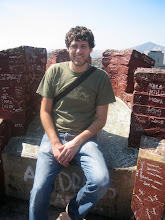This week before last, Chile held its second round of National Elections and the center-right candidate, Sebastian Piñera, won with a small majority over the center-left Eduardo Frei. During our first few weeks here, we experienced a bit of the election fervor with the candidates smiling faces pasted on cheesy billboards all over Santiago and small flag-carrying rallies showing their support for the candidates at opportune times and places across the city. Nothing felt entirely urgent about the election and this was reflected by apathetic responses about the political scene in Chile by people we had talked to along the way. The night Piñera won, the only thing different about Santiago was the ubiquitous blaring of car horns from all corners of the city, a sound seemingly equal in support of and in disgust to the news of the election.
For a little history behind the election, Michelle Bachelet is the current president with over an 80% approval rating over her four years in office and she is a socialist from the center-left Concertacion coalition that has been in charge of Chile (in various forms from Socialist to Christian Democrat) over the last twenty years since the brutal fascist military dictatorship of Augusto Pinochet. Eduardo Frei was already president in the late 1990s that got the ticket then based on his father being an important president of the left of the pre-Allende, pre-Coup era. Frei’s presidency was marked by a general rise in the economy based on global (neoliberal economic) trends and the Chileans we talked to say all they remember about his presidency is that ‘he went on a lot of trips’. His campaign promised to continue the popularity of Bachelet’s policies. So, exciting and inspiring candidate, he was not.
Sebastian Piñera is a billionaire who owns a national TV station, part of the national airline and the national soccer team, and loads of other investments that he made through the success of the Chilean economy from the 80s onward. He has run for president for the past couple elections, but was always soundly defeated by the more popular Concertacion candidates. His win has made his business interests confusing for Chileans, as I gathered from talking to one man, and he has to sell everything off before taking office to ensure impartiality to his private interests. Just like Dick Cheney and Haliburton, right? Right.
Making matters more difficult for Piñera was Chile’s historical experience with parties from the right – namely the (American influenced) Pinochet era of brutal authoritarian oppression, secret police, thousands of deaths and disappearances, and a disastrously failed neoliberal economic plan that left unemployment and hunger high for the majority (to which I will write another post about because of its importance to Chilean history and national character, as well as to my own academic interest – more on that later). He was up against a mountain of mistrust of the right and his platform was based on not being politically connected to the Pinochet era (although he certainly benefitted economically at the expense of the majority based on his interests) and wanted to offer change from the now-lackluster Concertacion coalition. The Concertacion coalition’s apathetic and uninspiring appeal to voters was based on a “don’t go right” plead. It was an opportune time for Piñera and the right, by all accounts, and Frei barely put up a convincing fight.
No one we have talked to actually voted in the elections. Some showed support for either candidate, but certainly felt disenfranchised by the whole political process. I cannot blame them. Politics of Chile is largely based on your name and your connections (sound familiar, Bush? Clinton?) and those in the congress and in presidency have mostly had family historically involved in politics. The candidates are not seen as inspiring figures, but rather a pick of the lesser-of-two-evils in a world of private sector economic successes for Chile that people more want to associate themselves with – that’s where Piñera was able to find his calling as a private-sector prodigy over Frei’s, well, still-lucky-to-be-in-power positioning.
For me and for many, before the run-off vote between Piñera and Frei, there was an independent candidate named Marco Enriquez-Ominami (MEO) from the left that won 20% of the vote that was particularly exciting. He is a socialist who actually wanted to start changing Chile’s socially conservative institutions regarding gay rights and women’s reproductive rights, among many other initiatives. From what I’ve been informed, it’s a first for Chilean politics – it wasn’t even debated between Frei and Piñera. MEO is a filmmaker and a Paris-educated intellectual that rallied the younger generation of the left around the inconsistencies in the ruling center-left party regarding social class and individual rights, and to get 20% of the vote before the runoff, not to mention being only in his late 30s, as well as being the son of an important counter-figure of the 1973 military coup, shows that he may be an important figure for years to come in Chile. After this lackluster election and the disenfranchisement of many of the people in their national politics, Chile’s future certainly looks interesting from MEO’s angle.

No comments:
Post a Comment